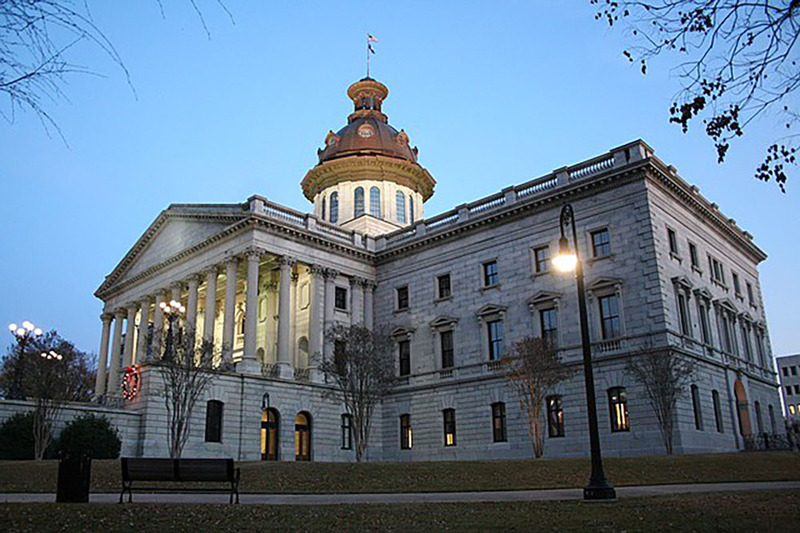AMERICAN WEDDINGS BLOG
Stay up to date with the latest wedding ceremony trends, script writing inspiration, tips and advice for first-time officiants, and news that matters to couples and wedding ministers.
Stay up to date with the latest wedding ceremony trends, script writing inspiration, tips and advice for first-time officiants, and news that matters to couples and wedding ministers.
Published Monday, Jan. 23rd, 2023
Last updated Tuesday, Dec. 10th, 2024

The new year brings new legislative sessions and a bunch of new proposed marriage laws!
Here’s a quick look at some of the marriage related legislation introduced or continuing in 2023.
Here at AMM, we follow these developments closely in order to keep our ministers up-to-date and to make sure we and you are always compliant with state marriage laws. It’s just one more reason to check this blog regularly! We also maintain an online library with each state’s marriage statutes for your reference:
AMM's State Marriage Laws Library
It’s important to note that the list below is incomplete. Some measures aren’t included here, and new measures will continue to be introduced in the coming weeks and months.
Still, this roundup provides a pretty good look at the most important issues being discussed by legislators, wedding officiants, and engaged couples right now.
♢
Several states are proposing amendments to their constitutions and statutes to protect same-sex and interracial marriage rights, including Alaska, Florida, Indiana, Missouri, and Virginia.
Multiple states are considering whether to raise the legal age to marry to 18 years old, including Hawaii, Illinois, Kansas, Mississippi, New Hampshire, South Carolina, Washington, West Virginia, and Wyoming.
Several states are revisiting who can perform weddings there, including Illinois, Maryland, Minnesota, and Virginia.
Two states are considering religiously-motivated marriage laws: Missouri lawmakers seek to pass covenant marriage laws to restrict some marriages to “one man and one woman” and limit grounds for divorce; and lawmakers in South Carolina want to require mutual applications for divorce and divorce waivers on marriage license applications.
South Carolina will consider whether services (including marriage services) can be denied to LGBTQ+ people because of their sexual orientation or gender; New York will discuss penalties for religious barriers to remarriage; Oklahoma discusses an end to common law marriage; Mississippi considers lowering the age of consent to marry; South Carolina and Texas will discuss removing the waiting period to marry; and New Jersey and New Mexico will consider remote / online marriage services.
----♢----
This resolution speaks in favor of protecting same-sex marriage rights by amending the state’s constitution. It proposes that an amendment to the Alaska State Constitution be placed on the ballot during the next general election to repeal Article I, Sec. 25, which states that valid marriage in Alaska “may exist only between one man and one woman.” This resolution was introduced by Representative Andy Josephson.
This bill would protect same-sex marriage rights in the state by repealing Section 741.212 of the Florida Statutes. This section is an unconstitutional same-sex marriage ban, which states that no same-sex marriage or civil union will be recognized in the state (regardless of where it is solemnized) and that marriage is restricted to unions between one man and one woman only. This bill was introduced by Senator Tina Polsky.
Minimum age to marry
This bill would raise the minimum age to marry to 18 years old (from 16) without exceptions. Among other changes, the bill would repeal Sections 572-2 (Consent of a parent or guardian) and 572-9 (Persons under age). The House bill is sponsored by Representatives Linda Ichiyama, Terez Amato, John Mizuno, Gregg Takayama, and David Tarnas; the Senate bill is sponsored by Senators Karl Rhoads, Michelle Kidani, and Maile Shimabukuro.
Related: How Old Do You Have To Be To Get Married In Each State?
Who can solemnize marriage
This bill would add the following officials to the list of people who can solemnize marriage: a State executive branch constitutional officer; and a member of the General Assembly. This bill would amend the Illinois Marriage and Dissolution of Marriage Act and is sponsored by Representative Jonathan Carroll.
Minimum age to marry
This bill would require that applicants for a marriage license be at least 18 years old, and removes the existing exceptions for minors aged 16 or 17 years old. This bill was introduced by Representative Joe Sosnowski.
Same-sex marriage rights
This bill would expressly protect same-sex marriage rights in the state by repealing an unconstitutional statute that restricts marriage to a union between one man and one woman, and amending the law such that “Marriage between persons of the same gender is legal in Indiana.”
See our full coverage of this bill:

Several states, including Indiana, are stepping up to protect same-sex marriage access by amending unconstitutional marriage bans and statutes
Same-sex marriage rights
This bill would protect same-sex marriage rights in the state by repealing two statutes: One that restricts marriage to unions between a man and a woman, and one that declares same-gender marriages void in Indiana, regardless of where they were solemnized. The bill states that “An emergency is declared for this act,” and was authored by Senator Andrea Hunley, co-authored by Senator J.D. Ford.
Minimum age to marry
This bill would raise the minimum age to marry in the state to 18 years old (from 16) with no exceptions. This bill is sponsored by the Committee on Federal and State Affairs and would take effect from and after its publication in the statute book.
Minimum age to marry
This bill would lower the age of majority from 21 years old to 18 years old. In relation to marriage, this means that only marriage applicants under the age of 18 would be required to show consent from a parent or guardian or a judge’s permission to marry. This includes boys 17 years of age (the minimum age to marry for boys) and girls 15 to 17 years of age (15 is the minimum age to marry for girls). This bill was introduced by Senator Dennis DeBar.
Who can solemnize marriage
This bill would give the clerk of the circuit court for the county the authority to designate a deputy clerk to perform a marriage ceremony, instead of the county administrative judge. If passed, this law would take effect October 1, 2023. This bill is sponsored by Sen. Michael A. Jackson.
Who can solemnize marriage
These bills would allow notary publics to perform civil marriages for a fee, if the notary is a licensed business with the Office of the Secretary of State and has filed their credentials with a local registrar. This bill was introduced by Rep. John Huot.

Several states will reconsider who can solemnize marriage there.
Covenant marriage license
These bills are known as the "Missouri Covenant Marriage Act.” They would create provisions for religious covenant marriages in the state, including a special covenant marriage license, notarized affidavit, and limited grounds for divorce. Couples would be required to sign a document stating that “marriage is a covenant between one man and one woman who agree to live together as husband and wife for as long as they both live,” and to seek premarital and marital counseling. The House bill was authored by Rep. Mitch Boggs; the Senate bill is sponsored by Senator Mike Moon.
Same-sex marriage rights
This resolution speaks in favor of protecting marriage rights in the state by allowing residents to vote to remove the same-sex marriage ban from the state’s constitution. The House proposes an amendment to the Constitution of the state of Missouri, which would change the definition of marriage as a union “between a man and a woman” to a gender-neutral union “between two individuals,” be placed on the ballot during the next general election or special election. This bill is sponsored by Representative Chris Sander.
Related: How to Get Married in Missouri - Planning a Wedding in the Show-Me State
Gender-neutral marriage laws & other updates
This bill would repeal a section of the law that prohibits anyone with a venereal disease from marrying in the state, and would replace gendered terms (such as bride or groom) with gender-neutral language (such as spouse). This bill was introduced by Sen. John Fredrickson.
Minimum age to marry
This bill would raise the minimum age to marry to 18 years old (from 16), without exceptions. If passed, the new age restrictions would become effective after 60 days. The bill was introduced by Representative Cassandra Levesque.
Interracial marriage rights
This bill would protect interracial marriage rights by adding ‘race’ to the listed qualities protected for equal access to marriage. If passed, the amendment would take effect 60 days after becoming law. The bill is sponsored by Representatives Ben Ming, Keith Ammon, Allison Nutting-Wong, Matthew Wilhelm, and Luz Bay.
Remote/ virtual marriage laws
This bill would allow a marriage or civil union license to be issued and solemnized via audio-visual technology, provided that all parties and a witness/es are physically located in the state, can interact in real-time, and follow other specific criteria. This bipartisan bill was introduced in February of 2022 by Assemblyman Raj Mukherji and Assemblyman Don Guardian and would become effective immediately if passed.
Related: Don’t forget! New Jersey marriage licenses are free until June 2023
Remote/ virtual marriage laws
This bill would create new provisions to allow active duty members of the armed services to apply for a marriage license and have their marriage solemnized remotely, using audio-visual technology, provided certain requirements are met. This bill was introduced by Senator Michael Padilla.

New Jersey and New Mexico will consider new rules for online marriage services in their states.
Religious barriers to remarriage
This act defines financial penalties for failing to remove religious barriers to remarriage following a divorce. The act would create a new subsection to Article 13, Section 253 of the NY Domestic Relations law, to require all parties to an annulment or divorce to remove religious barriers to remarriage within ninety days of filing, or else pay a fine of $2500 dollars per week. Currently, there is no stipulated fee or time frame for removing religious barriers to remarriage. This act was introduced by Assemblymember Linda Rosenthal, and would become effective 120 days after becoming law.
Who can solemnize
New York recently passed a new law that allows anyone over the age of 18 to apply for a one-day marriage officiant license, to be issued by the Secretary of State. This bill would amend that law, such that applicants will apply for the permit with the town or city clerk in the location where the wedding will be held (not the Secretary of State). This bill is sponsored by Brad Hoylman-Sigal.
Read our full coverage of New York's new one day officiant permit:

New York lawmakers consider barriers to remarriage and changes to the one-day officiant application process.
Common law marriage
This bill would prohibit common law marriages from being recognized in the state, excluding any common law marriages established before the change in law becomes effective. This bill was introduced by Senator Roland Pederson.
Marriage license applications & grounds for divorce
This bill is known as the ‘Religious Freedom Of Marriage Act” and would amend the marriage application process while limiting access to divorce. If passed, all couples would be required to select or waive specific grounds for divorce on their marriage license application. In addition, parties to a marriage would be required to file a mutual application for divorce, with new limitations on when an application could be filed. This bill was introduced by Representative Thomas Beach and would take effect upon approval by the Governor.
AMM interviewed Rep. Beach about the ethical and legal concerns this bill raises. See our full coverage here:

Lawmakers in South Carolina will discuss several marriage bills this year,
from limits to divorce to the minimum age to marry.
Refusing services to LGBTQ+ people
This bill is known as the “Live And Let Live Act.” If passed, it would prohibit the government from taking certain legal actions against individuals, businesses, government employees, and religious organizations who refuse services or jobs to LGBTQ+ people because of their sexual orientation or gender identity. For example, it would allow county clerks to recuse themselves from issuing a marriage license to a same-sex couple or performing their ceremony, and businesses could refuse services related to a same-sex marriage. This bill would become effective upon approval by the Governor and was introduced by Rep. Thomas Beach.
Minimum age to marry
This bill would raise the minimum age to marry to 18 years old (from 16) with no exceptions. This change would include common law marriages and would take effect upon approval by the Governor. This bill was introduced by Senator Bradley Hutto.
Marriage waiting period
This bill would remove the 24-hour waiting period to marry in the state, allowing couples to apply for a marriage license and hold their ceremony on the same day. Currently, marriage licenses are issued one day after a couple completes their application. This bill was introduced by and would take effect upon approval by the Governor.
See our full coverage of the bill here:

Will South Carolina and Texas eliminate their marriage waiting periods in 2023?
Add gendered language to marriage license
This bill would require that all state marriage license certificates include lines for the contracting parties to sign, using the gendered language of “Bride” and “Groom” on all licenses*. This bill was introduced by Senator Michael Gambrell and would take effect upon approval by the Governor.
* This proposed change ignores the existence of same-sex and nonbinary partners, and their constitutional right to marry in the state.
Marriage waiting period
This bill would remove the 72-hour waiting period to marry in the state. If passed, sections 2.204 and 6.110 of the Family Code would be repealed, such that couples would be able to apply for their marriage license and legally marry on the same day. This bill was introduced by Senator Juan Hinojosa.
Who can solemnize marriage
This bill would remove the $500 bond requirement for a layperson to officiate a wedding, and would place clerks (rather than judges) in charge of issuing the order to authorize a layperson to officiate by amending §20-25 of the Code of Virginia. This bill was introduced by Delegate Alfonso H. Lopez.
Same-sex marriage rights
These bills would add a new section the Code of Virginia to expressly protect same-sex marriages, declaring all marriages “lawful regardless of the sex or gender of such persons.” The new law would also allow religious organizations and members of the clergy to refuse to perform these marriages. The Senate bill was introduced by Senators Adam Ebbin and Jennifer Boysko; the House bill was introduced by Delegate Mark D. Sickles.
Same-sex marriage rights
These resolutions speak in favor of protecting same-sex marriage rights by amending the state’s constitution. The House of Delegates and Senate resolve that a majority of members of both houses agree that Section 15-A of Article I of the Constitution of Virginia, which states that marriage is only valid between one man and one woman, and prohibits the state from creating or recognizing any legal union assigned the same benefits of marriage, is unconstitutional and should be repealed. Patrons and Co-Patrons of these measures include Delegates Mark D. Sickles and Kelly K. Convirs-Fowler; and Senators Adam P. Ebbin and Jennifer B. Boysko.
Minimum age to marry
This bill would eliminate provisions for 17 year olds to marry in the state, such that the minimum age to marry would be 18 years old with no exceptions. This bill is sponsored by Representative Monica Stonier.
Minimum age to marry
This bill would prohibit anyone under the age of 18 from marrying by eliminating all exceptions and provisions for minors, including exceptions for parental or judicial consent. This bill is sponsored by Senator Charles Trump.
Minimum age to marry
This bill would raise the minimum age to marry to 18 years old, with some exceptions. Minors aged 16 or 17 would be able to marry with consent from a guardian and a judge’s approval. Children under 16 years old would be unable to marry, with no exceptions. This bill is sponsored by Representatives Ember Oakley and Dan Zwonitzer, and Senators Cale Case and Dan Furphy. The new guidelines would become effective July 1st, 2023.
----♢----
Lawmakers around the country will be discussing dozens of proposed changes to marriage laws in the coming days and weeks as the 2023 legislative season continues. To stay informed on what’s new and what might change regarding marriage laws in your state, visit the AMM News Page on the blog, and subscribe to AMM’s Monthly Newsletter:

American Marriage Ministries is a non-profit, interfaith and non-denominational constitutional church that provides free ordination, advocacy, and training for our ministers to ensure that all people have the right to get married and to perform marriage. Learn more here.
Updated December 5, 2024
You might also like:
Become a Wedding Officiant with Our Free Online Ordination!